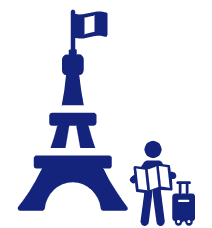
Mastering French Attitude: 10 Mistakes Every American Should Avoid | Everything You Need to Know
A common stereotype is that French people are perceived as rude and cold, especially from the perspective of Americans. However, Americans often unintentionally violate certain French cultural etiquettes, which can upset others. To fully enjoy the beauty of France and its extraordinary people, it is essential to learn about French etiquette and avoid these 10 common cultural mistakes made by Americans!
1.Greeting
Get comfortable with La Bise! The French typically do not greet each other with hugs or simple handshakes like Americans often do. When welcoming a new French friend, exchange greetings with light air kisses — starting with the left cheek, then the right. At first, it might feel a bit awkward, but this unique aspect of French etiquette is a great way to make a positive first impression. With a bit of practice, it will soon become second nature!
2.Being Overly Familiar, too soon
Americans often become friends quickly, but in France, you may need to be cautious not to become too friendly too soon. French etiquette and cultural norms are primarily based on showing respect for others and honoring the right moments for displaying that respect. A simple way to do this is by using “vous” instead of “tu” when speaking to someone in French. “Tu” is an informal way of saying “you,” while “vous” is the formal way to address someone with respect. If you are not very close to someone or are speaking to someone unfamiliar, using “vous” is appropriate. When meeting someone for the first time, you can also show respect by addressing them as “Madame” or “Monsieur.”
3.Speaking Only in English
Many French people can speak English, so it might seem easy to communicate in your native language. However, remember that not everyone speaks English! This is a common cultural mistake among Americans. When speaking to someone for the first time, try saying this sentence: “Bonjour! Je ne parle pas français, est-ce que vous parlez anglais ?” This means, “Hello! I can’t speak French, can you speak English?” Even if this is the only sentence you know, it will make a great impression on the French!
4. Finishing Your Food Quickly
In France, eating quickly is not the norm; meals are a time for enjoying good food and conversation. If you’re dining in a restaurant, you’ll notice that French people almost never finish their plates completely. If you don’t finish your plate, they may assume there was something wrong with the food. To show you enjoyed your meal, take a piece of bread and use it to clean your plate! While this may seem like poor etiquette in other cultures, in France, it’s an important part of dining etiquette.
Another aspect of this cultural principle is the frequency of service in restaurants. In America, waiters often check in on you, and it’s expected that they are always available. However, in France, the relationship between waiters and customers is quite different. Americans might feel their waiter is ignoring them if they aren’t checked on during the meal or when it’s time for the bill. But in France, if a waiter approaches you too often, it can be seen as rude and excessive! If you need something during the meal or want the bill, politely signal to the waiter. If you’re in a hurry or need to leave by a certain time, you can inform the waiter in advance.
5. Changing the Menu
As you might have guessed, the French take their food very seriously. When a chef creates a menu item at a restaurant, they expect customers to enjoy it as intended. In France, requesting to remove or alter specific ingredients is seen as an unpleasant request. Of course, you can always ask for changes, but if the chef declines your request, you shouldn’t be surprised. The only exception to this rule is if you have allergies, in which case you should inform the waiter before placing your order or call ahead to check if they can accommodate you. They may still say no!
6. Not Saying "Bonjour!"
There’s a joke among non-French speakers that if a French person’s house is on fire, they’ll rush to the fire station, say “Bonjour,” and then ask for help. While this is somewhat exaggerated, it’s not far from the truth. In France, whenever you approach someone, you must always start with “Bonjour” or “Bonsoir.” This is especially true when interacting with shopkeepers or service personnel. This simple aspect of French etiquette will serve you well!
7. Tipping Culture and French Etiquette
The tipping culture is vastly different between the United States and France. In America, many service workers rely on tips to supplement their wages. However, in France, service workers do not depend on tips in the same way and do not always expect them. While tipping exists in France, it is usually much lower than in America and is given only for exceptional service. A typical tip for dinner in France might range from 3-10% of the total bill.
8.Talking Loudly in Public
If you’re dining in a restaurant, make sure your voice isn’t louder than those around you. The French can be very annoyed by “loud Americans.” A key aspect of French etiquette is being aware of the people around you. Therefore, speaking or laughing loudly in public is generally seen as poor manners. As long as you are mindful of your volume and considerate of other customers, it shouldn’t be an issue. If you find yourself more focused on the noise than your conversation, you might want to consider sitting outside on the terrace.
9.Cheers!
When you make a toast or say “cheers” (in French, it’s “Tchin Tchin” or “Santé”), it is very important to make eye contact with each person at the table. This tradition comes from an old superstition that breaking eye contact during a toast will bring seven years of bad luck.
10. Conversation Taboos
In general, the French do not like to ask personal questions. Specifically, discussing money, especially how much someone earns, is considered very impolite. Furthermore, if business topics come up, try not to dwell on them during the conversation, as the French generally prefer to talk about more (and often more interesting) subjects. When in doubt, a safe topic to discuss is food.
French Etiquette at the Market
One of the wonderful aspects of daily life in France is the local farmers’ markets. At these markets, you might feel tempted to touch the fruits and vegetables, just like you would in a supermarket—but this is a big cultural mistake. Instead of picking the items yourself, politely ask the vendor for the quantity you want. They will then gather the items for you. If you are particularly interested in a specific product, you can kindly point it out and inquire about it from the vendor.
The correction involves changing “farmer’s markets” to “farmers’ markets” for correct plural possessive and replacing “inquire about it with the vendor” with “inquire about it from the vendor” for better phrasing.
Now You're Ready!
By understanding these social taboos, you’ll be able to integrate more smoothly into French society and earn more respect as an American in Paris. Now that you’re more aware of these 10 cultural mistakes in France, it’s time to explore your new country, enjoy the food, and meet new people (the French way)!
